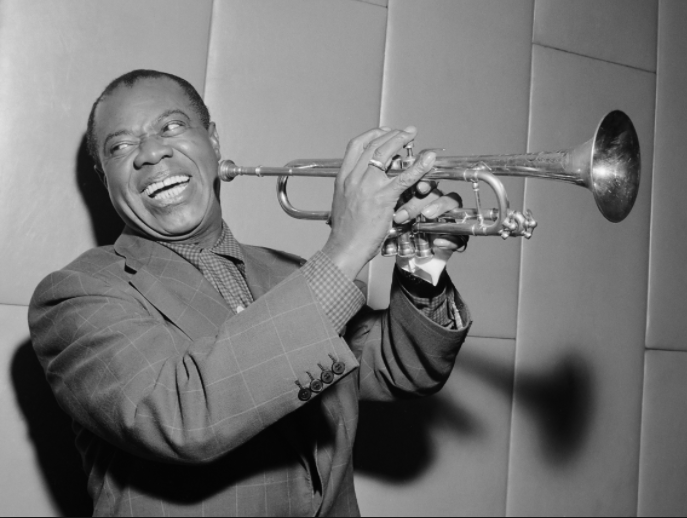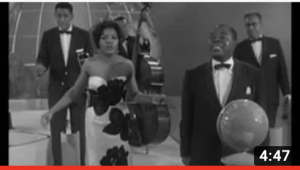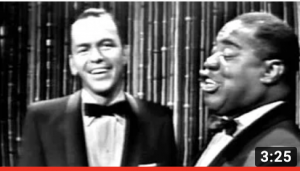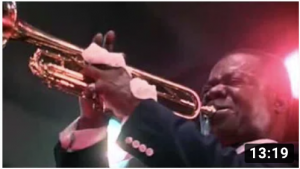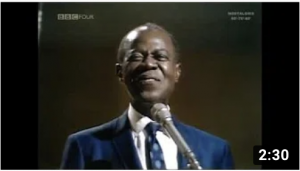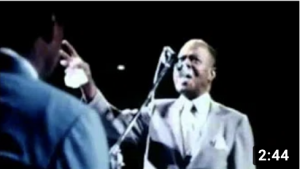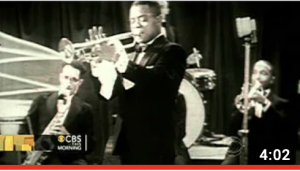Louis Daniel Armstrong (August 4, 1901 – July 6, 1971), nicknamed Satchmo, Satch, and Pops, was an American trumpeter, composer, singer and occasional actor who was one of the most influential figures in jazz. His career spanned five decades, from the 1920s to the 1960s, and different eras in the history of jazz. In 2017, he was inducted into the Rhythm & Blues Hall of Fame.
Louis Armstrong Personal Life
Armstrong was born and raised in New Orleans. Coming to prominence in the 1920s as an “inventive” trumpet and cornet player, Armstrong was a foundational influence in jazz, shifting the focus of the music from collective improvisation to solo performance. Around 1922, he followed his mentor, Joe “King” Oliver, to Chicago to play in the Creole Jazz Band. In the Windy City, he networked with other jazz musicians, reconnecting with his friend, Bix Beiderbecke, and made new contacts, which included Hoagy Carmichael and Lil Hardin. He earned a reputation at “cutting contests”, and moved to New York in order to join Fletcher Henderson’s band.
With his instantly recognizable gravelly voice, Armstrong was also an influential singer, demonstrating great dexterity as an improviser, bending the lyrics and melody of a song for expressive purposes. He was also very skilled at scat singing. Armstrong is renowned for his charismatic stage presence and voice almost as much as for his trumpet playing. Armstrong’s influence extends well beyond jazz, and by the end of his career in the 1960s, he was widely regarded as a profound influence on popular music in general.
Louis Armstrong Awards
Awards and Honors:
1949 – Louis Armstrong reigned as King Zulu on Mardi Gras day in New Orleans in 1949.
1952 – Armstrong inducted into the Down Beat Jazz Hall of Fame. (Armstrong was the first honoree)
1965 – Louis Armstrong wins “Best Male Vocal Performance” Grammy Award for his Hello, Dolly! single. The song was also nominated for “Record of the Year”. (April 13, 1965)
1972 – Armstrong honored with Grammy Lifetime Achievement Award. (1972)
1990 – Rock and Roll Hall of Fame as early influence. (1990)
1995 – US Postal Service issues Louis Armstrong commemorative stamp.
1997 – ASCAP Jazz Wall of Fame.
1997 – Life Magazine’s “The 100 People Who Made The Millenium.” Pops was #69 on the list. (1997)
1999 – NPR’s 100 Most Important American Musical Works of the 20th Century cncludes “West End Blues,” “St. Louis Blues” and “Hello, Dolly!”
1999 – Variety Magazine – “Top 100 Entertainers of the 20th Century.”
1999 – Time Magazine – “100 Most Influential People of the 20th Century.” (1999)
2001 – The New Orleans International Airport was renamed to Louis Armstrong New Orleans International Airport.
2003 – Library of Congress – Armstrong’s “Hot Five and Hot Seven” recordings (1925-1928) were designated for preservation by the National Recording Registry
The Grammy Hall of Fame:
Chimes Blues (1923 – Armstrong’s first recorded cornet solo)
Heebie Jeebies (1926 – Armstrong’s first recorded scat vocal)
Mack The Knife (1955 single; Louis Armstrong & the All-Stars)
St. Louis Blues (1925 single; Bessie Smith with Louis Armstrong)
West End Blues (1928 single; Louis Armstrong and his Hot Five)
What A Wonderful World (1967 single; Louis Armstrong)
Porgy and Bess (1958 album; Louis Armstrong & Ella Fitzgerald)
Hello, Dolly! (1964 single; Louis Armstrong)
All of Me (1932 single; Louis Armstrong & His Orchestra)
Blue Yodel #9 (1930 single; Jimmie Rodgers featuring Louis Armstrong)
St. Louis Blues (1929 single; Louis Armstrong & His Orchestra)
Weather Bird (1928 single; Louis Armstrong & Earl Hines)
Star Dust (1931 single; Louis Armstrong)
Louis Armstrong Hits
Billboard Top 40 Albums:
Satch Plays Fats (#10 in 1955)
Ella and Louis (#12 in 1956)
Hello, Dolly! (#1 for 6 weeks in 1964)
Billboard Top 40 Singles:
Mack The Knife (#20 in 1956)
Blueberry Hill (#29 in 1956)
Hello, Dolly! (#1 in 1964; dislodged The Beatles)
What A Wonderful World (#32 in 1988; from “Good Morning Viet Nam”)
Billboard R&B Singles Chart:
I Wonder (#3 in 1945)
The Frim Fram Sauce (#4 in 1946)
That Lucky Old Sun (#14 in 1949)
Quotes about Louis Armstrong
“Louis Armstrong was the single most important influence on American popular music in the 20th century.” – Wynton Marsalis
“If you have to ask what jazz is, you’ll never know.” – Louis Armstrong
“Louis Armstrong was the embodiment of jazz. He took the music to a whole new level and paved the way for generations of musicians.” – Herbie Hancock
“He was the greatest soloist that jazz has ever known.” – Duke Ellington
“What we play is life.” – Louis Armstrong
“Louis Armstrong was a genius musician and a wonderful human being. His music will live forever.” – Ella Fitzgerald
“If it hadn’t been for Louis Armstrong, there wouldn’t be any jazz.” – Benny Goodman
“Louis Armstrong was an innovator who changed the way people thought about music. He was a true pioneer.” – Dave Brubeck
“He was the beginning and the end of music in America.” – Max Kaminsky
“Louis Armstrong taught me how to improvise. He taught me how to swing.” – Miles Davis
The Boy Who Became King: Louis Armstrong’s Journey to Musical Greatness
Louis Armstrong, the jazz icon, is known as one of the most influential musicians of the 20th century. His unique style, characterized by his virtuosic trumpet playing and soulful vocals, helped to define the sound of jazz and has inspired generations of musicians. But Armstrong’s road to musical greatness was not an easy one. In this post, we will take a journey through Armstrong’s early life and career, exploring the story of how he became a musical legend.
Louis Armstrong’s Early Life
Armstrong was born into poverty in New Orleans in 1901. His parents separated when he was young, and he was raised by his grandmother in a rough neighborhood known as the “Battlefield”. Despite the challenges he faced growing up, Armstrong was introduced to music at a young age, and it quickly became a passion for him.
Armstrong’s Musical Career Takes Off
As a young man, Armstrong began playing trumpet in local bands in New Orleans. His talent quickly caught the attention of jazz musician King Oliver, who invited Armstrong to join his band in Chicago. This move proved to be a turning point in Armstrong’s career, as he began to gain national attention for his skill as a musician.
The Rise of Louis Armstrong
Throughout the 1920s and 1930s, Armstrong’s career continued to flourish. He formed his own bands, recorded hit songs, and toured the world. Armstrong’s music had a unique style that combined elements of blues, ragtime, and swing, and it was embraced by audiences everywhere.
Armstrong’s Legacy in Jazz
Armstrong’s impact on the world of jazz was significant. His unique style and virtuosic playing helped to define the sound of the genre, and his influence can be heard in the work of countless jazz musicians who came after him. Armstrong’s contributions to the jazz world will be remembered for generations to come.
Louis Armstrong’s journey to musical greatness was a remarkable one. From his humble beginnings in New Orleans to his rise to fame as a jazz icon, Armstrong’s story is a testament to the power of music and the human spirit. As we reflect on Armstrong’s life and career, let us take a moment to appreciate the joy and beauty of his music, and to carry his spirit with us always. Armstrong may have been known as the “boy who became king”, but his impact on the world of music was nothing short of legendary.
The Jazz Revolution: How Louis Armstrong Changed the Sound of Music in the 20s and 30s
Louis Armstrong, the jazz legend, is widely recognized as one of the most influential musicians of the 20th century. His unique style, characterized by his virtuosic trumpet playing and soulful vocals, helped to define the sound of jazz and has inspired generations of musicians. In this post, we will explore how Armstrong changed the sound of music during the 20s and 30s, and how his musical innovations helped to shape the genre of jazz.
Armstrong’s Early Musical Career
Armstrong’s musical career began in New Orleans, where he played in local bands and honed his craft. It was during this time that he developed his unique style, characterized by his virtuosic trumpet playing and his use of improvisation. Armstrong’s talent quickly caught the attention of jazz musicians and fans alike, and he began to gain a reputation as one of the most exciting musicians of his time.
The Birth of Jazz in the 20s
During the 1920s, jazz music was on the rise, and Armstrong’s impact on the genre was significant. His unique style helped to define the sound of jazz, and his influence can be heard in the work of countless jazz musicians who came after him. Armstrong’s music was a reflection of the time, capturing the spirit of the era with its upbeat rhythms and soulful melodies.
Armstrong’s Musical Innovations in the 30s
During the 1930s, Armstrong continued to innovate and push the boundaries of jazz music. He introduced scat singing, a style of vocal improvisation that became a hallmark of his music. He also collaborated with other jazz musicians, such as Duke Ellington, to create groundbreaking works of music that pushed the genre forward.
The Legacy of Louis Armstrong
Armstrong’s impact on the world of jazz was significant, and his contributions to the genre continue to be celebrated today. His unique style and virtuosic playing helped to define the sound of jazz, and his influence can be heard in the work of countless jazz musicians who came after him. Armstrong’s legacy in jazz will be remembered for generations to come.
Louis Armstrong’s impact on the world of music during the 20s and 30s was significant. His musical innovations helped to shape the genre of jazz, and his influence can still be felt today. As we reflect on Armstrong’s contributions to music, let us take a moment to appreciate the beauty and power of his music, and to celebrate his enduring legacy as one of the greatest musicians of all time.
The Jazz Age Goes Global: Louis Armstrong’s Legacy as a Jazz Ambassador
Louis Armstrong, the jazz legend, is widely recognized as one of the most influential musicians of the 20th century. His unique style, characterized by his virtuosic trumpet playing and soulful vocals, helped to define the sound of jazz and has inspired generations of musicians. In addition to his musical contributions, Armstrong played a vital role as a cultural ambassador, using his music to promote peace and understanding around the world. In this post, we will explore Armstrong’s legacy as a Jazz Ambassador, and how he helped to spread the joy of jazz music across the globe.
The Role of Jazz Ambassadors
In the years following World War II, the U.S. government established a cultural diplomacy program known as the Jazz Ambassadors. The program aimed to promote American culture and values around the world, using jazz music as a tool for cultural exchange. Louis Armstrong was selected as one of the first Jazz Ambassadors, and he quickly became one of the most recognizable faces of the program.
Armstrong’s First Trip as a Jazz Ambassador
Armstrong’s first trip as a Jazz Ambassador took him to Europe in 1955. The trip was not without its challenges, as Armstrong faced racism and discrimination both at home and abroad. However, Armstrong’s music transcended these barriers, and he quickly won over audiences with his infectious personality and virtuosic playing. Armstrong’s music had a universal appeal that touched people from all walks of life, and he used his platform as a Jazz Ambassador to spread a message of peace and understanding.
Armstrong is the Ultimate Jazz Ambassador
Armstrong’s music continues to inspire and move people around the world, and his role as a Jazz Ambassador has played a significant part in shaping global culture. His music had a universal appeal that transcended cultural and linguistic barriers, and his message of peace and understanding continues to resonate today. Armstrong’s jazz diplomacy serves as a reminder of the importance of cultural exchange and the power of music to bring people together.
Louis Armstrong’s role as a Jazz Ambassador was a remarkable one. He used his music to promote peace and understanding around the world, and his work as a cultural ambassador continues to be celebrated today. As we reflect on Armstrong’s life and career, let us take a moment to appreciate the beauty and power of his music, and to celebrate his enduring legacy as one of the greatest musicians and cultural ambassadors of all time.
Behind the Scenes with Louis Armstrong: Stories of His Movie Roles and Collaborations
Louis Armstrong, the jazz icon, was not only a musical legend but also a successful movie star. Throughout his career, he appeared in dozens of films, leaving his mark on the world of cinema with his unique style and unmistakable sound. In this post, we will take a journey through Armstrong’s movie career, exploring the stories behind his roles and collaborations with directors and actors.
Louis Armstrong’s Early Movie Roles
Armstrong’s movie career began in the early 1930s when he made his debut in “Ex-Flame” and “The Big Broadcast”. These early appearances showcased Armstrong’s talent as a musician, as he played trumpet and sang in several scenes. His music was an integral part of the films, adding depth and emotion to the stories being told.
In 1936, Armstrong landed his first major role in the film “Pennies from Heaven”. In the film, Armstrong played a character named Henry, who helps the protagonist find hope and happiness through his music. Armstrong’s performance in the film was a breakthrough moment for him, and it helped to establish him as a legitimate actor as well as a musician.
Louis Armstrong’s Collaborations with Directors and Actors
Throughout his movie career, Armstrong collaborated with many notable directors and actors. One of his most successful collaborations was with director Fred Zinnemann, who directed Armstrong in the film “The Five Pennies”. In the film, Armstrong played a fictionalized version of himself, telling the story of his life and career as a jazz musician. Zinnemann’s direction, combined with Armstrong’s music, created a powerful and emotional film that showcased Armstrong’s talent as an actor as well as a musician.
Another notable collaboration was with actor Bing Crosby in the film “High Society”. In the film, Armstrong played a jazz musician who helps Crosby’s character win back his ex-wife. Armstrong’s performance in the film was one of the highlights, with his infectious smile and undeniable charm lighting up the screen.
Louis Armstrong’s Legacy in Film
Armstrong’s impact on the world of cinema was significant. His music added a new dimension to film, and his charismatic on-screen presence helped to define the role of the musician in movies. Armstrong’s collaborations with directors and actors helped to create some of the most memorable moments in film history.
Even today, Armstrong’s music continues to be used in movies and television shows. His unique sound has become synonymous with the Golden Age of Hollywood, and his music remains an important part of the cinematic canon.
Louis Armstrong’s Place in the History of Film Music
Armstrong’s place in the history of film music is secure. His music helped to define a genre, and his influence can be heard in the work of countless film composers and musicians. Armstrong’s contributions to the world of cinema will be remembered for generations to come.
Louis Armstrong’s movie career was a significant part of his legacy. His roles and collaborations helped to define the role of the musician in film, and his music added a new dimension to the movies. Armstrong’s impact on the world of cinema remains relevant today, and his music continues to inspire and move audiences across generations. As we reflect on Armstrong’s movie career, let us take a moment to appreciate the joy and beauty of his music, and to carry his spirit with us always.
Discovering the Legacy of Louis Armstrong: How His Music Continues to Impact Generations
Louis Armstrong, the jazz icon who left an indelible mark on the music world, continues to inspire and influence musicians today. His legacy lives on through his music, which continues to resonate with audiences across generations. In this post, we will explore the lasting impact of Armstrong’s contributions to jazz, the significance of his music, and his enduring relevance today.
The Legacy of Louis Armstrong
Armstrong’s music has influenced countless musicians in the jazz world and beyond. His unique style, characterized by his virtuosic trumpet playing and distinctive vocals, has left an impression on generations of artists. From Miles Davis to Wynton Marsalis, many jazz greats have cited Armstrong as a major influence on their work.
But Armstrong’s influence extends far beyond the jazz world. His music has also had a profound impact on the broader cultural landscape, shaping American culture in important ways. His blend of blues, ragtime, and swing music helped to create the sound of the 20th century, influencing everything from rock and roll to hip-hop.
The Significance of Louis Armstrong’s Music
One of the most remarkable things about Armstrong’s music is its universal appeal. His infectious melodies and upbeat rhythms have a way of transcending boundaries, bringing people together across cultures and generations. From the streets of New Orleans to the stages of Europe, Armstrong’s music has moved people all over the world.
At the heart of Armstrong’s music is a sense of joy and exuberance that continues to inspire and uplift people today. His music has a way of making us feel alive, reminding us of the power of human connection and the importance of living in the moment. Whether we’re tapping our feet to “What a Wonderful World” or swaying to “Hello Dolly,” Armstrong’s music has a way of moving us like no other.
Louis Armstrong’s legacy is one that continues to inspire and move us today. His music has left an indelible mark on the jazz world and the broader cultural landscape, shaping American culture in important ways. His enduring relevance speaks to the power of his music and the impact it has had on generations of listeners. As we reflect on Armstrong’s legacy, let us take a moment to appreciate the joy and beauty of his music, and to carry his spirit with us always.
FAQ – Frequently Asked Questions about Louis Armstong
Louis Armstrong
- The Sound of 007 (2022) We Have All the Time in the World
- No Time to Die (2021) We Have All the Time in the World
- Drive My Car (2021) You’re Driving Me Crazy (What Did I Do?)
- Nobody (2021) What a Wonderful World
- The United States vs. Billie Holiday (2021) Struttin’ with Some Barbecue
- Letters to Santa 4 (2021) La Vie en Rose
- Outside the Wire (2021) Stars Fell on Alabama
- Capone (2020) Blueberry Hill
- Dolemite is My Name (2019) La Vie en Rose
- Second Act (2018) Cool Yule
- Planeta Single 2 (2018) What a Wonderful World
- Ben is Back (2018) Cool Yule
- Taxing Love (2018) Can’t We Be Friends, Isn’t This a Lovely Day
- The Trip to Spain (2017) A Foggy Day
- The Farthest (2017) Melancholy Blues
- Moon Rock City (2017) Ac-Cent-Tchu-Ate The Positive
- Assasin’s Creed (2016) The From Fram Sauce
- 20th Century Women (2016) Basin Street Blues
- A United Kingdom (2016) I’m Confessin’ (That I Love You)
- The Age of Shadows (2016) When You’re Smiling
- Finding Dory (2016) What a Wonderful World
- Range 15 (2016) What a Wonderful World
- My Hindu Friend (2015) La Vie en Rose
- Phantom Boy (2015) Dream a Little Dream of Me
- Huevos: Little Rooster’s Egg-cellent Adventures (2015) What a Wonderful World
- Long Story Short (2015) Darling Nelly Grey
- Men, Women & Children (2014) Melancholy Blues
- One Day Since Yesterday: Peter Bogdanovich & the Lost American Film (2014) They All Laughed
- Jimmy’s Hall (2014) Sugar Foot Strut
- Easy Life (2014) Struttin’ With Some Barbecue/
- Salaud on t’aime (2014) They Can’t Take that Away from Me, Cheek to Cheek
- Alive Inside: A Story of Music and Memory (2014) When the Saints Go Marching In
- Sorrow and Joy (2013) Otchi-Tchor-Ni-Ya
- Blue Jasmine (2013) Aunt Hagar’s Blues
- The Great Gatsby (2013) St Louis Blue, Ain’t Misbehavin’
- Fortroligheten (2013) What a Wonderful World
- Everything or Nothing (2013) We Have All the Time in the World
- The Four (2012) Ain’t Misbehavin’
- Beware of Mr. Baker (2012) Boff Boff
- Back to the Sea (2012) What a Wonderful World
- New Year’s Eve (2011) What a Wonderful World
- Tom Sawyer (2011) If I Could Be With You (One Hour Tonight)
- Friends with Kids (2011) I’ve Got My Love to Keep Me Warm
- Monte Carlo (2011) La Vie en Rose
- The Fairy (2011) It’s Wonderful
- Jumping the Broom (2011) La Vie en Rose
- Head Over Heels (2010) What a Wonderful World
- Di Di Hollywood (2010) La Vie en Rose
- Rio Sex Comedy (2010) St James Infirmary Blues
- Shanghai (2010) If I Could Be With You (One Hour Tonight)
- Soul Kitchen (2009) The Creator Has a Master Plan
- The Boys (2009) ‘Bout Time, Ten Feet Off the Ground
- The Cry of the Own (2009) A Kiss to Build a Dream On
- The Curious Case of Benjamin Button (2008) Dear Old Southland, If I Could Be with You (One Hour Tonight), Big Butter and Egg Man
- French Film (2008) A Kiss to Build a Dream On
- Me and Orson Welles (2008) I’m Shooting High
- Wall-E (2008) La Vie en Rose
- Harold & Kumar Escape from Guantanamo Bay (2008) What a Wonderful World
- American Gangster (2007) Winter Wonderland
- La Hora Trip (2006) Nobody Knows the Trouble I’ve Seen
- Southland Tales (2006) If I Could Be With You (One Hour Tonight)
- Relative Strangers (2006) Exactly Like You
- Un Mundo Maravilloso (2006) What a Wonderful World
- Tylko Mine Kochar (2006) What a Wonderful World
- Lord of War (2005) A Kiss to Build a Dream On
- Bewitched (2005) ‘Bout Time
- Madagascar (2005) What a Wonderful World
- Constellation (2005) Stars Fell on Alabama
- Marilyn Hotchkiss’ Ballroom Dancing & Charm School (2005) On the Sunny Side of the Street
- Suwingu Ganuzu (2004) What a Wonderful World
- Miracle (2004) White Christmas
- Something’s Gotta Give (2003) La Vie en Rose
- Love Me If You Dare (2003) La Vie en Rose
- Chooch (2003) A Kiss to Build a Dream On
- La gran aventura de Mortadelle y Filemon (2003) La Vie en Rose
- The Quiet American (2002) La Vie en Rose
- Mr Deeds (2002) Cheek to Cheek
- Bowling for Columbine (2002) What a Wonderful World
- Serendipity (2001) Cool Yule
- The Cat’s Meow (2001) Everybody Loves My Baby
- Pearl Harbor (2001) Jeepers Creepers
- Town & County (2001) Ain’t Misbehavin’
- Russian doll (2001) Kiss of Fire
- Blow (2001) Cool Yule
- Pollock (2000) Blues in the South, Mahogany Hall Stomp
- American Woman (2000) A Kiss to Build a Dream On
- Joe Gould’s Secret (2000) Muskrat Ramble
- Liberty Heights (1999) If
- My Life So Far (1999) The Sunny Side of the Street
- The Love Letter (1999) I’m in the Mood for Love
- The Children of the Marshland (1999) West End Blues
- Office Space (1999) All That Meat and No Potatoes
- My Favorite Martian (1999) Let’s Fall in Love
- At First Sight (1999) A Kiss to Build a Dream On, They Can’t Take That Away from Me
- You’ve Got Mail (1998) Dummy Song
- The Life and Times of Hank Greenberg(1998) Gee Baby, Ain’t I Good to You
- A la place du core (1998) Beale Street Blues
- Madeline (1998) What a Wonderful World
- Doctor Doolittle (1998) Talk to the Animals
- The Imposters (1998) Skolaan
- Wrestling with Alligators (1998) What a Wonderful World
- Out to Sea (1997) I Only Have Eyes for You
- My Son the Fanatic (1997) Back O Town Blues
- Taste of Cherry (1997) St James Infirmary
- That Old Feeling (1997) That Old Feeling
- Secrets of the Hear (1997) Lord You Made the Night Too Long
- Still Breathing (1997) Old Man Mose
- Wild Man Blues (1997) Hear Me Talking’ To Ya
- My Fellow Americans (1996) Life is So Peculiar
- Nitrato d’argento (1996) I’ll Be Glad When You Are Dead
- Children of the Revolution (1996) Just One of Those Things, You’re the Top
- Prisoner of the Mountains (1996) Go Down Moses
- Grumpier Old Men (1995) (I’ll Be Glad When You’re Dead) You Rascal You
- 12 Monkeys (1995) What a Wonderful World
- How to Make an American Quilt (1995) La Vie en Rose
- Things to Do in Denver When You’re Dead (1995) Makin’ Whoopee
- Forget Paris (1995) April in Paris
- French Kiss (19995) La Vie en Rose
- Miami Rhapsody (1995) Just One of Those Things
- Love Affair (1994) Life is So Peculiar
- Only You (1994) Only You (And You Alone)
- Corrina, Corrina (1994) You Go to My Head
- Bluesland: A Portrait in American Music (1993) West End Blues
- Sleepless in Seattle (1993) A Kiss to Build a Dream On
- Erotic Liaisons (1992) La Vie en Rose
- Ciao, Professore (1992) What a Wonderful World, Ain’t Misbehavin’
- Mr. Saturday Night (1992) La Vie en Rose, Fantast, That’s You
- Storyville (1992) When it’s Sleepy Time Down South
- Class Act (1992) Jeepers Creepers
- Rambling Rose (1991) Done
- Guilty by Suspicion (1991) I’m Just a Lucky So and So, Jeepers Creepers
- Scenes from a Mall (1991) Give Me Your Kisses (I’ll Give You My Heart)
- Queens Logic (1991) I’ve Got the World on a String
- Texasville (1990) Basin Street Blues, He’s a Son of the South
- Come See the Paradis (1990) If We Never Meet Again
- Driving Miss Daisy (1989) Kiss of Fire
- Harlem Nights (1989) Drop Me Off in Harlem
- When Harry Met Sally (1989) Our Love is Here to Stay, Let’s Call the Whole Thing Off, Auld Lang Syne
- John Huston: The Man, the Movies, the Maverick (1988) St Louis Blues
- Good Morning, Vietnam (1987) What a Wonderful World
- Soul Man (1986) (What Did I Do to Be So) Black and Blue
- The Color Purple (1985) My Heart
- Kak Molody my Byli (1985) Basin Street Blues
- Karkalou (1984) St Louis Blues, Georgia on My Mind
- Repo Man (1984) See See Rider
- They All Laughed (1981) Ain’t Misbehavin’, Memories of You
- Stardust Memories (1980) Stardust
- The Hollywood Knights (1980) Hello Dolly
- Saint Jack (1979) I An’t Gonna Give Nobody None of My Jelly Roll, Basin Street Basin Street Blues, Someday You’ll Be Sorry
- Escape to Athena (1979) When the Saints Go Marching In
- Killer of Sheep (1978) West End Blues
- That’s Entertainment, Part II (1976) Now You Has Jazz
- The Man Who Fell to Earth (1976) Blueberry Hill
- The Day of the Locust (1975) Jeepers Creepers
- Brother Can You Spare a Dime (1975) Jeepers Creepers
- Pete, Pearl & the Pole (1973) The Sheik of Araby
- Wen die pollen Tanten kommen (1970) Medley
- Hello Dolly (1969) Hello Dolly
- On Her Majesty’s Secret Service (1969) We Have All the Time in the World
- July Rain (1967) La Vie en Rose
-
A Man Called Adam (1966) Someday Sweetheart, Back o’ Town Blues
When the Boys Meet the Girls (1965) How it Out Your Mind - Auf Wiedersehen (1961) Canal St Blues, Dipper Mouth Blues, Pretty Little Missy, Back O Town Blues
-
Paris Blues (1961) Wild Man Moore
Jazz on a Summer’s Day (1959) Up a Lazy River, Tiger Rag, Rockin’ Chair, When The Saints Go Marching In - The Beat Generation (1959) Someday You’ll Be Sorry
- The Five Pennies (1959) Goodnight – Sleep Tight, When the Saints Go Marching In, After You’ve Gone, Bill Bailey, Won’t You Please Come Home, The Battle Hymn of the Republic
- Die Nacht vor der Premiere (1959) Kisses in the Night
- Satchmo the Great (1957) St Louis Blues, When the Saints Go Marching In, Memphis Blues, C’est si bon
- High Society (1956) High Society Calypso
- The Glenn Miller Story (1954) Basin Street Blues
- Glory Alley (1952) Glory Alley, That’s What the Man Said
- Here Comes the Groom (1951) Misto Cristofo Columbo
- The Strip (1951) A Kiss to Build a Dream On
- Botta e riposte (1950) That’s My Desire
- A Song is Born (1948) A Song is Born, Goldwyn Stomp
- New Orleans (1947) Do You Know What it Means to Miss New Orleans, Maryland, My Maryland, Where the Blues Were Born in New Orleans, Buddy Bolden’s Blues, Farewell to Storyville, The Blues Are Brewin’, Indie, west End Blues
- Atlantic City (1944) Harlem on Parade, Ain’t Misbehavin’
- Jam Session 1944) I Can’t Give You Anything but Love
- Going Places (1938) Jeepers Creepers, Mutiny in the Nursery
- Doctor Rhythm (1938) The Trumpet Player’s Lament
- Artis and Models (1937) Public Melody Number One
- Pennies from Heaven (1935) Skeleton in the Closet
Hello Dolly
Hello Dolly reached #1 on the Billboard Top 100 on May 9, 1964, knocking Can’t Buy Me Love by The Beatles out of first place.
This Jazz Inspiration profile is sponsored by Sacramento Top 10, the best place to find restaurants, spas, home improvement services and more.
Louis Armstrong Songs
Discography
1923
Snake Rag
Workin’ Man Blues
Chattanooga Stomp
London (Cafe) Blues
Just Gone
Dipper Mouth Blues (Dippermouth Blues)
Jazzin’ Babies’ Blues
Sweet Baby Doll
Camp Meeting Blues
New Orleans Stomp
Canal Street Blues
Mandy Lee Blues
I’m Going Away to Wear You Off My Mind
Chimes Blues
Weather Bird Rag
Froggie Moore
Sweet Lovin’ Man
High Society Rag
Sobbin’ Blues
Where Did You Stay Last Night?
Buddy’s Habit
Tears
I Ain’t Gonna Tell Nobody
Room Rent Blues
Riverside Blues
Mabel’s Dream
1924
Manda
Go ‘Long, Mule
Tell Me Dreamy Eyes
My Rose Marie
Don’t Forget You’ll Regret Day by Day
Shanghai Shuffle
See See Rider Blues
Jelly Bean Blues
Countin’ the Blues
Texas Mooner Blues
Of All the Wrongs You’ve Done to Me
One of These Days
My Dream Man
The Meanest Kind of Blues
How Come You Do Me Like You Do
The Sheik of Araby
Everybody Loves My Baby
Papa, Mama’s All Alone Blues
Terrible Blues
Baby I Can’t Use You No More
Trouble Everywhere I Roam
Mandy Make Up Your Mind
Poor House Blues
Anybody Here Want to Try My Cabbage
Thunderstorm Blues
If I Lose, Let Me Lose (Mama Don’t Mind)
Good Time Flat Blues
I’m a Little Blackbird Looking for a Bluebird
Nobody Knows the Way I Feel Dis Mornin’
See See Blues
Early in the Morning
Naughty Man
Changeable Daddy of Mine
Santa Claus Blues
Prince of Wails
Screamin’ the Blues
Early Every Morn
1925
You’ve Been a Good Ole Wagon
I’ll See You in My Dreams
Sobbin’ Hearted Blues
Cold in Hand Blues
Alabamy Bound
Swanee Butterfly
Poplar Street Blues
12th Street Blues
Me Neenyah (My Little One)
Mining Camp Blues
Cast Away
Papa De-Da-Da
The World’s Jazz Crazy and So Am I
Shipwrecked Blues
Court House Blues
My John Blues
Memphis Bound
Just Wait ‘Til You See My Baby Do the Charleston
Livin’ High Sometimes
Coal Cart Blues
Carolina Stomp
You Can’t Shush Katie (The Gabbiest Girl in Town)
Lucy Long
I Ain’t Gonna Play No Second Fiddle
Low Land Blues
My Heart
Yes! I’m In The Barrel
Gut Bucket Blues
Squeeze Me
Why Couldn’t It Be Poor Little Me?
Bye and Bye
Play Me Slow
You’ve Got to Beat Me to Keep Me
Railroad Blues
When You Do What You Do
T N T
Kid Man Blues
Lazy Woman’s Blues
Lonesome Lovesick
Gambler’s Dream
Sunshine Baby
Adam and Eve Had the Blues
Put it Where I Can Get it
Washwoman Blues
I’ve Stopped My Man
1926
Muskrat Ramble
Come Back Sweet Papa
Lonesome, All Alone And Blue
Trouble In Mind
A Georgia Man
You’ve Got To Go Home On Time
What Kind O’ Man Is That
Deep Water Blues
G’wan, I Told You
Lonesome hours
Georgia Grind
Cornet Chop Suey
Oriental Strut
You’re Next
A Jealous Woman Like Me
Special Delivery Blues
Jack O’diamond Blues
The Mail Train Blues
I Feel Good
A Man For Every Day Of The Week
After I Say I’m Sorry
Georgia Bo Bo
Static Strut
Stomp Off, Let’s Go
Drop That Sack
Heebie Jeebies
Big Butter and Egg Man
1927
Willie the Weeper
Wild Man Blues
Melancholy
Dead Drunk Blues
Have You Ever Been Down?
Lazy Man Blues
The Flood Blues
Chicago Breakdown
Alligator Crawl
Potato Head Blues
Twelfth Street Rag
Weary Blues
Keyhole Blues
S. O. L. Blues
Gully Low Blues
That’s When I’ll Come Back To You
The Last Time
Struttin’ With Some Barbeque
Got No Blues
Once In A While
I’m Not Rough
Hotter Than That
Savoy Blues
1928
Sugar Foot Strut
Two Deuces
A Monday Date
Don’t Jive Me
West End Blues
Save It Pretty Mama
Weather Bird
Muggles
I Can’t Give You Anything But Love
I Must Have That Man!
Baby!
I Sweathearts On Parade
I Heah Me Talkin’ To Ya?
St. James Infirmary
Tight Like This
1929
Ain’t Misbehavin’
Knockin’ A Jug
Mahogany Hall Stomp
S’Posin’
To Be In Love (Espesh’lly With You)
Funny Feathers
How Do You Do It That Way?
When You’re Smiling
After You’ve Gone
I Ain’t Got Nobody
Dallas Blues
Saint Louis Blues
Rockin’ Chair
1930
If We Never Meet Again
Song of the Islands
Bessie Couldn’t Help It
Blue Turning Grey Over You
Dear Old Southland
My Sweet
I Can’t Believe That You’re in Love with Me
I’m a Ding Dong Daddy (from Dumas)
If I Could Be with You (One Hour Tonight)
Body and Soul
Memories of You
You’re Lucky to Me
Sweethearts on Parade
Standing on the Corner (Blue Yodel No. 9)
What It Takes To Bring You Back
EX-FLAME
Just a Gigolo
1931
When It’s Sleepy Time Down South
Chinatown, My Chinatown
Stardust
Shine
Walkin’ My Baby Back Home
I Surrender Dear
Blue Again
Little Joe
I’ll Be Glad When You’re Dead You Rascal You
Them There Eyes
When Your Lover Has Gone
Up A Lazy River
You Can Depend on Me
Georgia On My Mind
The Lonesome Road
I Got Rhythm
1932
Love, You Funny Thing
High Society
Rhapsody in Black and Blue
Between the Devil and the Deep Blue Sea
Kickin’ the Gong Around
All of Me
That’s My Home
Hobo, You Can’t Ride This Train
I Hate to Leave You Now
You’ll Wish You’d Never Been Born
1933
I’ve Got the World on a String
I Gotta Right to Sing the Blues
Hustlin’ and Bustlin’ for Baby
Sittin’ in the Dark
He’s a Son of the South
Some Sweet Day
Basin Street Blues
Honey, Do!
Snow Ball
Swing You Cats
1935
I’m in the Mood for Love / You Are My Lucky Star
Red Sails in the Sunset
1937
Alexander’s Ragtime Band
Public Melody Number One
On a Little Bamboo Bridge
1938
When the Saints Go Marching In
Jeepers Creepers
Nobody Knows the Trouble I’ve Seen
Hey Lawdy Mama
1944
No Love No Nothing
Is My Baby Blue Tonight
Blues in the Night
Keep on Jumpin’
Harlem on Parade
King Porter Stomp
It’s Love, Love, Love
Whatcha Say
Groovin’
Baby Don’t You Cry
Louise
Goin’ My Way?
Sweet and Lovely
Is You or Is You Ain’t My Baby
Perdido
Me and Brother Bill
Swingin’ on a Star
Confessin’
It Had to be You
Solid Sam
Dance with the Dolly
I’ll Walk Alone
Jack-Armstrong Blues
Confessin’ that I Love You
1945
I Wonder
1946
You Won’t Be Satisfied With Ella Fitzgerald
Raymond Street Blues
Flee as a Bird
Shimme-Sha-Wabble
Ballin’ the Jack
Brahms’ Lullaby
The Blues Are Brewin’
Endie
Do You Know What It Means to Miss New Orleans?
Where the Blues Were Born in New Orleans
1947
Someday You’ll Be Sorry
Tiger Rag
Stompin’ at the Savoy
If I Loved You
Mop Mop
Back O’Town Blues
Roll ‘Em
I Wonder, I Wonder, I Wonder
I Believe
Why Doubt My Love?
It Takes Time
You Don’t Learn That in School
Reminiscin’ with Louis
Way Down Yonder in New Orleans
Pennies from Heaven
Royal Garden Blues
Panama
Before Long
Lovely Weather We’re Having
Black and Blue
Lover
On the Sunny Side of the Street
Baby Won’t You Please Come Home
That’s My Desire
C-Jam Blues
How High the Moon
Boff Boff
Blueberry Hill
1948
Blues from the Sky
The Flat Footed Foogie
I Ain’t Gonna Give Nobody None of My Jelly Roll
Blue Skies
Velma’s Blues
I Cried Last Night
Steak Face
Boogie Woogie on St. Louis Blues
Stars Fell on Alabama
Buzz Me Baby
Tea for Two
Someone to Watch over Me
Honeysuckle Rose
The One I Love Belongs to Someone Else
Together
Don’t Fence Me In
That’s a Plenty
East of the Sun
Tin Roof Blues
Little White Lies
Shadrack / When the saints go marching in
Maybe You’ll Be There
1949
That Lucky Old Sun
1950
La Vie en rose
C’est si bon
Dream a Little Dream of Me
1951
When We Are Dancing
Gone Fishin’
I Get Ideas
A Kiss to Build a Dream On
Back Home Again in Indiana
Cold, Cold Heart
1952
El Choclo
Takes Two to Tango
Winter Wonderland
1953
Zat you Santa Claus
Cool Yule
1954
Skokiaan
1955
Mack the Knife
Christmas Night in Harlem
1956
High Society Calypso
Now You Has Jazz With Bing Crosby
April in Paris With Ella Fitzgerald
Can’t We Be Friends With Ella Fitzgerald
Cheek to Cheek With Ella Fitzgerald
Moonlight in Vermont With Ella Fitzgerald
Isn’t This a Lovely Day With Ella Fitzgerald
They Can’t Take That Away from Me With Ella Fitzgerald
Under a Blanket of Blue With Ella Fitzgerald
Tenderly With Ella Fitzgerald
A Foggy Day With Ella Fitzgerald
Stars Fell on Alabama With Ella Fitzgerald
The Nearness of You With Ella Fitzgerald
1957
Makin’ Whoopee
I Get a Kick out of You
The Gypsy in My Soul
Let’s Do It, Let’s Fall in Love With Ella Fitzgerald
Willow Weep for Me
Autumn in New York With Ella Fitzgerald
Let’s Call the Whole Thing Off With Ella Fitzgerald
They All Laughed With Ella Fitzgerald
Oh Lawd, I’m On My Way
Don’t Be That Way With Ella Fitzgerald
Stompin’ at the Savoy With Ella Fitzgerald
I Won’t Dance With Ella Fitzgerald
Gee, Baby Ain’t I Good to You With Ella Fitzgerald
I’ve Got My Love to Keep Me Warm With Ella Fitzgerald
I’m Putting All My Eggs in One Basket With Ella Fitzgerald
A Fine Romance With Ella Fitzgerald
Love Is Here to Stay With Ella Fitzgerald
Learning the Blues With Ella Fitzgerald
1958
On My Way
Sometimes I Feel Like a Motherless Child
Christmas in New Orleans
1959
Frankie and Johnny
Uncle Satchmo’s Lullaby
1964
Hello, Dolly!
It’s Been a Long, Long Time
Moon River
1967
What a Wonderful World
1968
Zip-a-Dee-Doo-Dah
1969
We Have All the Time in the World For James Bond film, On Her Majesty’s Secret Service
1970
Get Together
